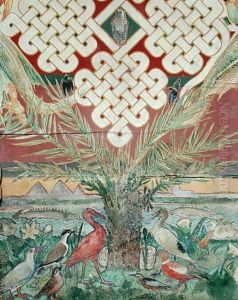John Hungerford Pollen Paintings
John Hungerford Pollen was an English artist born on the 19th of June 1820 in London, England. He was part of the 19th-century British aesthetic movement and closely associated with the Pre-Raphaelite Brotherhood, known for their attention to detail, vibrant colors, and interest in medieval culture. Pollen was not only an artist but also a craftsman, writer, and educator who played an integral role in the Victorian era’s reevaluation and appreciation of decorative arts.
Educated at home by his father Richard Pollen, John Hungerford Pollen later attended Eton College and subsequently earned a scholarship to King's College, Cambridge. He developed an interest in art early on but initially pursued a career in law. However, his passion for art prevailed, and he abandoned his legal aspirations to focus on painting and decorative arts.
Pollen became a close colleague of John Ruskin and was a founding member of the Oxford Movement, which aimed to revive Catholic traditions in the Anglican Church. His religious ideals deeply influenced his artistic endeavors. He was invited by John Henry Newman to decorate the Birmingham Oratory, which became one of his most notable commissions. Pollen’s work for the Oratory included stained glass, textiles, and other decorative elements, reflecting his versatility and commitment to art as a form of spiritual expression.
After his work at the Oratory, Pollen served as a professor of Fine Arts at the Catholic University in Dublin from 1854 to 1864. He wrote extensively on art and design, contributing to the growing discourse on the importance of art in society and its moral and educational value. His publications included essays on the philosophy of decorative arts and a study on the principles of design in ornamentation.
John Hungerford Pollen’s legacy is not only in his artwork but also in his influence on design education and his role in the Arts and Crafts Movement, which emerged later in the 19th century. His holistic approach to art, viewing it as an essential aspect of human culture and spirituality, paved the way for future generations of artists and designers. Pollen passed away on the 2nd of January 1902, but his contributions to the world of art and design continue to be recognized and celebrated.
